How Sleep Position Affects Snoring: Importance and Optimization Techniques
Sep 11th 2023
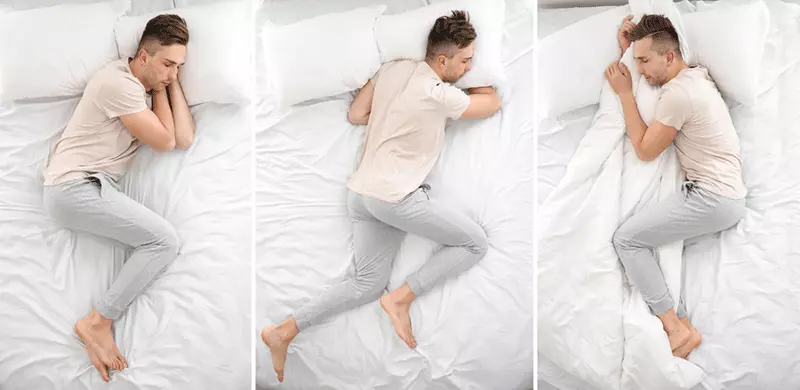
Are you or your partner losing sleep due to constant snoring? Have you considered the idea that your sleep position might be the culprit? As improbable as it may sound, your sleeping posture can significantly impact how much you snore. This blog post uncovers the surprising connection between sleep positions and snoring and reveals how simple physical adjustments can lead to quiet, restful nights. Harness the power of sleep orientation and discover effective optimization techniques — not only for a peaceful slumber but also for enhanced overall health. Join us on this enlightening journey - because better nights lead to brighter days!
Sleep position plays a significant role in snoring. Sleeping on your back can cause the throat muscles to relax and lead to snoring, while side sleeping can keep the airway open and reduce or eliminate snoring. Additionally, using a specially designed pillow or sewing/taping a tennis ball to the back of your pajamas can help maintain head and neck alignment for easier breathing during sleep. Finally, considering anti-snoring mouth guards or CPAP machines may be helpful for those with more severe cases of snoring.
The Link Between Sleep Position and Snoring
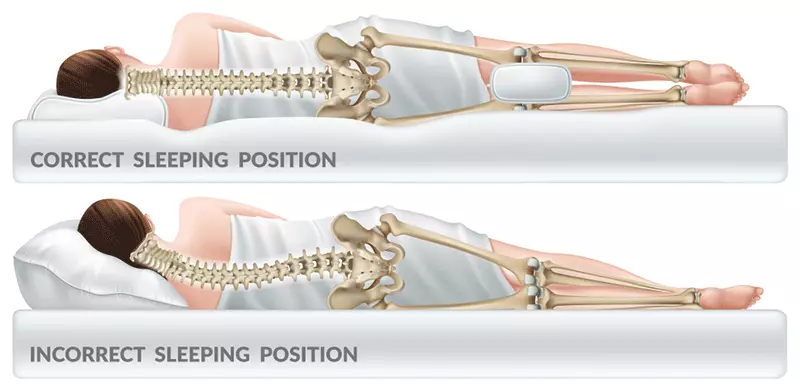
Did you know how you position your body during sleep can significantly impact snoring? It may seem surprising, but research has shown a clear link between sleep position and snoring. Understanding this connection can help you make informed choices about your sleep habits and potentially reduce the disruptive effects of snoring.
When we lay down to sleep, gravity affects our airways differently depending on our sleep position. The positions most commonly associated with snoring are sleeping on your back, supine, and stomach. Let's look at these positions and how they contribute to snoring.
Sleeping on your back can cause the throat muscles to relax and collapse, narrowing the airway passage. This obstruction leads to increased airflow resistance, resulting in vibrations of the soft tissues in the throat, which produce the snoring sound. Additionally, this position tends to encourage the tongue to fall back into the airway, further obstructing it. So, adjusting your sleep position may be beneficial if you’re a chronic snorer who primarily sleeps on your back.
Conversely, sleeping on your stomach can also contribute to snoring. This position can strain your neck and limit airflow through your airways. When lying face down, your head is turned to one side, causing the throat and neck muscles to become constricted. This constriction creates an obstruction that restricts smooth airflow during inhalation and exhalation, leading to snoring.
Imagine waking up every morning feeling groggy, restless, and exhausted due to excessive snoring throughout the night. You might even be consistently nudged by an annoyed bed partner who cannot get a good night's sleep because of your loud symphony of snores.
Now that we understand how sleep positions can contribute to snoring, let's explore the impact of different sleep positions on snoring in more detail.
Sleep Positions Impact on Snoring
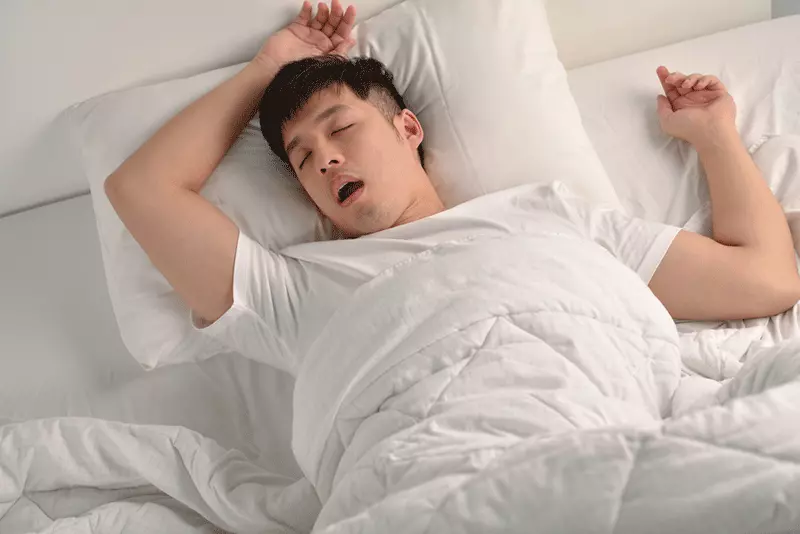
While sleeping on your back and stomach is known to increase the likelihood of snoring, there is a sleep position that may help reduce snoring – sleeping on your side. When you sleep on your side, gravity has less of an effect on the airways, allowing them to remain open and unobstructed. This positioning helps prevent the collapse and narrowing of the throat muscles, thus reducing snoring episodes.
Think of it like a river flowing smoothly when there are no obstacles in its path. Sleeping on your side allows the air to flow more freely through your airways, like a river meandering effortlessly through an open channel.
Additionally, elevating your head slightly with the help of specially designed pillows can also assist in keeping the airways clear and promote better breathing during sleep. These pillows help maintain proper head and neck alignment, preventing any obstructions that may lead to snoring.
It's important to note that while adjusting your sleep position can be helpful for some individuals in minimizing snoring, it might not be a one-size-fits-all solution. Other factors such as weight, alcohol consumption, smoking habits, and underlying conditions like sleep apnea can further aggravate snoring. It's always wise to consult a healthcare professional if you have persistent or problematic snoring issues.
- According to study published in the American Journal of Respiratory and Critical Care Medicine, about 56% of adult men and 40% of adult women snore. Many of these individuals are likelier to snore when they sleep on their backs.
- The British Snoring & Sleep Apnoea Association diaper reports that strategically designed pillows to adjust sleep position have helped reduce snoring frequency and intensity in up to 75% of positional snorers.
- Sleeping on your side can help reduce snoring by keeping the airways open. Elevating your head with a specially designed pillow can also assist in keeping the airways clear and promote better breathing during sleep. However, it's important to note that addressing other factors such as weight, alcohol consumption, smoking habits, and underlying conditions like sleep apnea may also be necessary. It's always wise to consult with a healthcare professional if you have persistent or problematic snoring issues.
Optimal Sleep Positions for Snoring Reduction
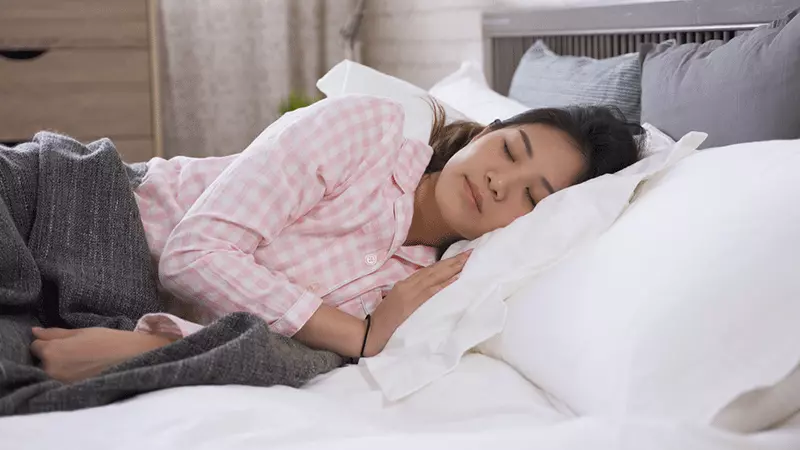
How you position yourself during sleep can significantly impact snoring. Finding the optimal sleep position that works for you can alleviate or even eliminate snoring altogether. Let’s explore some places that may help reduce snoring and promote better sleep.
Sleeping on your side is one recommended sleep position to minimize snoring. When you sleep on your back, throat muscles tend to relax and can obstruct the airway, leading to snoring. On the other hand, sleeping on your side helps keep the airways open and reduces the likelihood of snoring. It allows for smoother airflow and prevents soft tissues in the throat from collapsing and narrowing the airway, a common cause of snoring.
Another beneficial position for reducing snoring is elevating your head and upper body. An extra pillow or an adjustable bed base to raise your head by approximately 30 degrees can help ease breathing and reduce snoring. This position helps gravity work in your favor by allowing nasal passages to remain clear, reducing congestion, and minimizing obstructions in the throat.
To further illustrate various sleep positions and their impact on specific aspects related to sleep, take a look at this table:
| Sleep Position | Impact on Snoring | Other Considerations |
|---|---|---|
| Sleeping on | Can worsen | Positioning can |
| Your Back | snoring | contribute to low- |
| back pain | ||
| ---------------- | ------------------ | --------------------- |
| Sleeping on | Can keep | Side-sleeping may |
| Your Side | airways open and | be beneficial for |
| reduce snoring | neck pain relief | |
| ---------------- | ------------------ | --------------------- |
| Elevated Head | Reduces | Helpful for nasal |
| and Upper Body | snoring | congestion and |
| obstructed breathing |
Tips to Alleviate Snoring Through Positioning
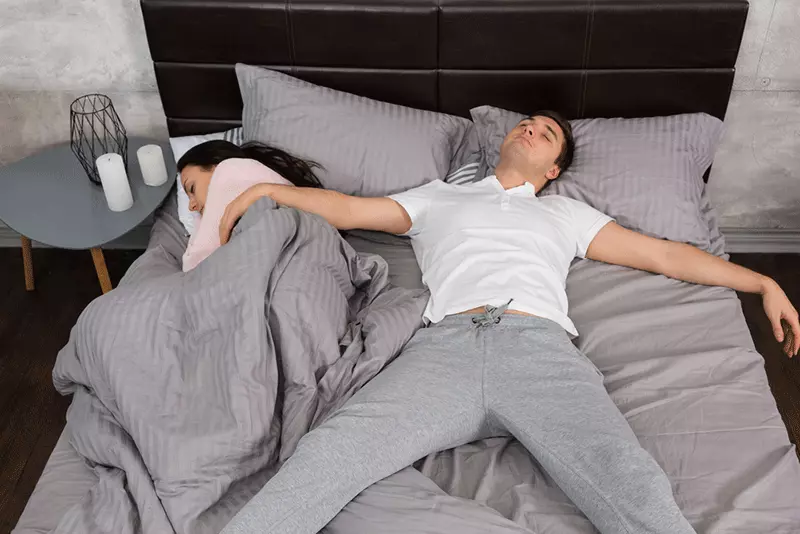
While finding the optimal sleep position is essential, it may take some experimentation to discover what works best for you. Here are some tips to help alleviate snoring through positioning:
Choose a side: If you’re accustomed to sleeping on your back, try training yourself to sleep on your side by using strategically placed pillows or investing in a body pillow that provides support.
Specialized pillows: Specially designed pillows can help maintain proper head and neck alignment, facilitating easier breathing during sleep. Wedge-shaped pillows made from memory foam or body pillows that support specific sleep positions can be beneficial.
Imagine John, who used to snore loudly while sleeping on his back. He decided to invest in a specialized pillow specifically designed for side-sleeping. With consistent use, he found that his snoring significantly reduced, allowing him and his partner to enjoy more restful nights.
Avoid sleeping on your back: To prevent rolling onto your back during sleep, you can sew or tape a tennis ball onto the back of your pajamas. This uncomfortable sensation will remind you to stay on your side throughout the night.
Sleeping on the left side: Sleeping on the left side of the body has multiple benefits beyond snoring reduction. It promotes better digestion, heart health, back health, spleen, and kidney support, and even helps relieve heartburn. Additionally, it aids in lymphatic system drainage.
Consider anti-snoring mouth guards or CPAP machines: If snoring persists despite various positioning techniques, it’s essential to consider underlying conditions such as sleep apnea. Anti-snoring mouth guards or continuous positive airway pressure (CPAP) machines prescribed by healthcare professionals can effectively reduce snoring episodes.
Now that we have explored various sleep positions for snoring reduction and tips to alleviate snoring through positioning let's discuss the potential risks and drawbacks of non-optimal sleep positions.
Risks and Drawbacks of Non-optimal Sleep Positions
Sleep position can significantly impact various aspects of sleep, including snoring. Understanding the risks and drawbacks of non-optimal sleep positions is crucial for addressing snoring issues effectively.
Back sleeping is a common culprit behind snoring problems. When you sleep on your back, the throat muscles tend to relax, which can lead to obstruction in the airway. This relaxation of muscles causes vibrations during breathing, resulting in the sound we commonly associate with snoring. Switching to a different sleep position, such as sleeping on your side or stomach, can keep the airway open and reduce or eliminate snoring.
Imagine waking up every morning feeling exhausted because your partner's snoring kept you up all night. It not only affects their quality of sleep but also directly impacts yours. Exploring the drawbacks of non-optimal sleep positions can help identify solutions that benefit both parties.
Stomach sleeping also has its drawbacks regarding snoring. Sleeping on the stomach can cause the soft tissues in the throat to collapse and narrow the airway, making it more challenging for air to pass through freely. This airway narrowing intensifies airflow resistance and increases the likelihood of snoring. Therefore, individuals who frequently experience snoring may find relief by adjusting their sleep from stomach to side sleeping.
Let’s consider John, who used to sleep flat on his stomach every night. His wife would often complain about the loud snores that kept her awake. Understanding the drawbacks of stomach sleeping helped John realize that changing his sleep position might solve their ongoing issue.
It's important to note that body positioning alone may not address all cases of snoring. Snoring can be influenced by various factors such as weight, alcohol consumption, smoking, and even sleep apnea. In cases where snoring persists despite switching sleep positions, it’s advisable to seek professional guidance to uncover any underlying conditions contributing to the problem.
Now that we’ve explored the risks and drawbacks of non-optimal sleep positions let's delve deeper into the specific drawbacks associated with stomach and back sleeping about snoring.
Drawbacks of Stomach and Back Sleeping
Stomach sleeping can exacerbate snoring due to its effect on the airway. The pressure exerted on the chest and abdomen while lying face-down can restrict smooth airflow, leading to increased resistance and vibrations in the throat. This hindrance of airflow heightens the likelihood of loud snoring.
Conversely, back sleeping is known to relax throat muscles, contributing to snoring. Gravity plays a role in this position, as it causes the base of the tongue and soft tissues in the throat to collapse towards the back of the mouth. As a result, the airway becomes narrower, amplifying snoring sounds.
It’s worth noting that these drawbacks are not exclusive to everyone. Some individuals may find that sleeping on their stomach or back does not affect their snoring. However, it is crucial for those who experience persistent or disruptive snoring to consider adjusting their sleep position as part of a comprehensive approach towards reducing or eliminating snoring episodes.
Rachel used to prefer sleeping flat on her back until she realized that her snoring was causing disturbances for her roommates during trips. By understanding the drawbacks associated with back sleeping and making a conscious effort to sleep on her side instead, she noticed significant improvements in her snoring issues.
Understanding how different sleep positions contribute to snoring enables individuals to make informed decisions about their sleep habits. It empowers them to explore alternative strategies and solutions that target specific issues tied to sleep positions, ultimately promoting better quality sleep for themselves and those around them.
Alternative Anti-Snoring Strategies and Solutions
Snoring can be a disruptive and frustrating condition for the person snoring and their sleep partner. While sleep position plays a significant role in snoring, several alternative strategies and solutions can help alleviate this problem and improve both individuals' sleep quality. Let’s explore some of these options.
One popular solution is the use of nasal dilators. Nasal dilators increase airflow through the nose, reduce congestion, and prevent snoring. The Rhinomed Mute Anti-Snoring Nasal Dilator is considered one of the best overall nasal dilators available, providing effective relief for snorers.
For some individuals, snoring is related to jaw positioning during sleep. An anti-snoring mouthpiece like ZQuiet Anti-Snoring Mouthpiece can be beneficial. By angling the jaw forward during sleep, these devices help open up airways and prevent snoring.
Another innovative solution is the use of anti-snore wristbands. These wristbands, such as the Inscape Data Anti-Snore Wristband, stimulate nerves and adjust mouth and chin positioning to stop snoring.
Additionally, Breathe Right Nasal Strips offer a non-invasive alternative. These strips adhere to the outside of your nose to shape it, providing a snug fit that helps open up nasal passageways and reduce snoring.
For those seeking a high-tech solution, Smart Nora offers an intriguing option. This system utilizes a pillow insert and monitoring device to detect snoring sounds. Once detected, it gently stimulates throat muscles, encouraging natural movement to prevent further snoring throughout the night.
On a different note, some individuals have found relief through alternative methods influenced by traditional Chinese medicine. The Xshows Magnetic Anti-Snoring Ring is designed to trigger acupuncture points connected to airways, aiming to reduce snoring.
The Farrinne Electric Anti-Snoring Solution offers a rechargeable option for those who prefer electric alternatives. This electric device provides relief by applying pressure and vibration to nasal passages, promoting improved airflow.
Lastly, DALIVA Anti-Snore Nasal Dilators are an excellent portable and easy-to-insert device made from medical-grade silicone. These versatile dilators can help open up nasal passageways and reduce the chances of snoring.
While these alternative anti-snoring strategies and solutions have shown promising results for many individuals, it's noting that different remedies work differently for each person. It may require some trial and error to find the solution that works best for you. Consulting with a healthcare professional or sleep specialist is advisable to ensure you receive appropriate guidance and personalized recommendations based on your circumstances.
By exploring these alternative anti-snoring strategies, you can take significant steps towards improving your sleep quality and reducing the disruptive effects of snoring on yourself and your bed partner.
Are there any devices or aids that can help optimize sleep position for reducing snoring?
Yes, there are various devices and aids available that can help optimize sleep position for reducing snoring. One popular option is the anti-snoring pillow, designed to properly align the head and neck during sleep, thus reducing airway blockage. Another option is a positional therapy device, which can detect when you're snoring and gently adjust your sleeping position to open up the airways. A study published in the Journal of Clinical Sleep Medicine states that positional therapy devices have shown efficacy in reducing snoring frequency and severity.
What techniques can change sleeping position during the night?
Several techniques can be used to change sleeping positions during the night. One effective strategy is using a body pillow that supports and encourages side sleeping, which has been proven to reduce snoring. Another method is placing a tennis ball on the back or side of your pajamas, which prevents you from rolling onto your back during sleep. Additionally, practicing good sleep hygiene, such as avoiding caffeine and establishing a consistent sleep schedule, can also help promote better sleep positions.
Are there any natural remedies or lifestyle changes that can help reduce snoring without changing sleep position?
Yes, there are natural remedies and lifestyle changes that can help reduce snoring without changing sleep position. For example, maintaining a healthy weight through diet and exercise can decrease the frequency and intensity of snoring. Additionally, avoiding alcohol and sedatives before bedtime can relax the throat muscles and reduce snoring. According to a study published in the American Journal of Respiratory and Critical Care Medicine, losing just 10% of body weight can significantly reduce snoring by improving airway function.
What medical conditions can cause snoring regardless of sleep position?
Medical conditions such as obesity, nasal congestion, and sleep apnea can cause snoring regardless of sleep position. Obesity increases the likelihood of snoring due to excess fatty tissue narrowing the airways. Nasal congestion, often caused by allergies or colds, restricts airflow and leads to snoring. Sleep apnea, a serious condition where breathing repeatedly stops and starts during sleep, is a common cause of snoring. According to the American Academy of Sleep Medicine, about 34% of men and 17% of women in the United States have the symptoms associated with chronic snoring, making it important to address these underlying health issues to alleviate snoring problems.
How do different sleep positions affect snoring?
Different sleep positions can greatly affect snoring. Sleeping on your back is more likely to cause snoring, as it allows the tongue and tissues in the throat to block the airway. On the other hand, side sleeping helps keep the airway open, reducing snoring. According to a study published in the Journal of Clinical Sleep Medicine, sleeping on your side reduces snoring by 38%. Therefore, changing sleep positions can play a crucial role in minimizing snoring.
